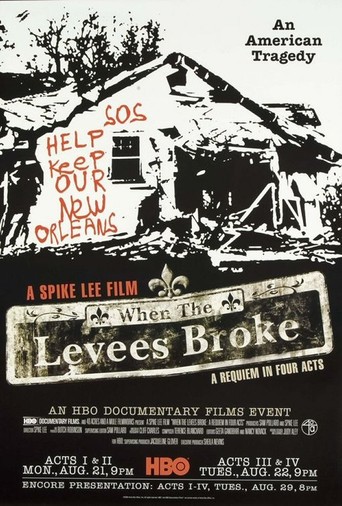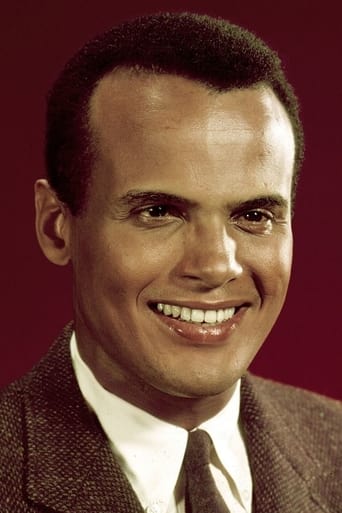

When the Levees Broke: A Requiem in Four Acts (2006)
In August 2005, the American city of New Orleans was struck by the powerful Hurricane Katrina. Although the storm was damaging by itself, that was not the true disaster. That happened when the city's flooding safeguards like levees failed and put most of the city, which is largely below sea level, underwater. This film covers that disastrous series of events that devastated the city and its people. Furthermore, the gross incompetence of the various governments and the powerful from the local to the federal level is examined to show how the poor and underprivileged of New Orleans were mistreated in this grand calamity and still ignored today.
Watch Trailer
Cast
Reviews
A great movie, one of the best of this year. There was a bit of confusion at one point in the plot, but nothing serious.
Story: It's very simple but honestly that is fine.
It's a good bad... and worth a popcorn matinée. While it's easy to lament what could have been...
The movie turns out to be a little better than the average. Starting from a romantic formula often seen in the cinema, it ends in the most predictable (and somewhat bland) way.
This is probably the most powerful documentary that I have ever seen. It stands as a historical record that will probably only become more valuable with time so that historians in 2050 will understand the depth of the man-made aspect of the tragedy.I happen to really like Spike Lee, and regard him as one of America's top 5 Auteurs, though one who takes big risks and sometimes misses the mark. It seems that the depth of the reality of this tragedy overwhelmed his faults and brought out the best in him. There is a focus on first-hand interviews from a variety of perspectives and documented fact, with a minimum of speculation. There is no narration, and he never appears on screen. Rather, the narrative is made through interviews and clever editing. This technique is extremely engaging, and the viewer is encouraged to (re)form their own understanding.The reality that there were many missed opportunities to avoid the suffering is heart-wrenching and uncomfortable.
In this very special documentary that Michael Moore would truly love, New Orleans was listening, but not listening enough. The big problem was when Hurricane Katrina was about to slam towards the New Orleans coast; at that point, most of New Orleans' residents thought that the hurricane would go east towards Texas and not hit Louisiana. They were wrong.As Katrina hit the Gulf Waters and strengthened after hammering the state of Florida as a Category 4 storm, the storm grew to the highest scale in the Saffir-Simpson scale---a Category 5. Seeing that hurricane on radar in the Gulf, even though I was no hurricane forecaster, I believe that winds had whipped up to 145 to 160 mph in the worst part of the storm. The air pressure in the hurricane reached about 900 millibars. That means that convective available potential energies in that storm could reach as high as 6,000 joules per kilogram and lifted indices as high as -11. You only get these readings in a very severe thunderstorm.In other words, Katrina was a monster storm that cannot be ignored.On August 28, 2005, hurricane watches were put out throughout the whole Gulf Coast. The mayor of New Orleans told all New Orleans people to evacuate, but some New Orleans residents could not get out. Then the city government made a plan to put all evacuees who could not get out of New Orleans before the hurricane to the Superdome in downtown New Orleans. I saw about 100,000-150,000 people herded in the Superdome like cattle.And even after the storm, things were not better. People were stranded for days. The Superdome got hotter and hotter and some people decided to get out of there. The New Orleans Convention Center did not fare any better. The government did not care for them, and that is why a fair amount of hurricane victims died in the streets and in the waters. And to top it all off, anarchy akin to what happened in south central Los Angeles during the riots of 1991 exploded like a nuclear bomb in New Orleans. Several looters were shot; police kept the destitute and dislocated away from higher ground; and even police who had powers to arrest were unable to do it. One testimony of a Black looter who got shot twice by someone firing a shotgun and ending up with buckshot wounds all over made me so scared, because you only see such stuff in westerns.For some people, the breach of the levee in 2007 that triggered most of the New Orleans flooding, especially those who were at the Gentilly area of New Orleans, caused enormous fears. Some people near the breach of the levee heard explosions, and this was akin to the dynamite detonations of the levee during the last hurricane in New Orleans in about 1962.
I apologise for stealing another person's point but I will make reference to the review written by Ric-7 and the first point he makes. A requiem is like a lament, a time to reflect and grieve over a loss or event. An autopsy or an enquiry is not a lament but is a clear look at the loss or event to identify the reasons for it. By putting requiem in the title of his film, Lee is making it clear for everyone that the intension is to grieve over that happened rather than deliver a precise factual opinion on what happened. So criticisms that this isn't precise and a tighter affair are unfair.However having said that the film does a great job of providing balance surprisingly so from Spike Lee, who I expected to play the race card, play everything up and point fingers in a one-sided diatribe. It could not have been further from the truth though because the film is actually pretty balanced. Of course there is an inevitable slant towards how terrible this whole shooting match was and is but then that is more to do with the fact that the whole event was terrible in all sorts of ways rather than the makers over-egging the cake. Set out in four acts the film deals with the build up and hitting of Katrina in act 1; the aftermath and response of the authorities in act 2; the human fall out as the evacuees try to cope in act 3 and finally the attempts to clear the city and look back in act 4.Watching it is a difficult experience. This is not because of the running time though, because it is so consistently engaging that I found my intentions to watch it in four parts turned into one sitting that seemed a lot shorter than it was. No, it is a difficult experience because of the emotions that hit you throughout. The loss of those caught up is well painted and several contributions had me crying although the film doesn't let us accept all of the victims as blameless and does feature people stating that they chose to stay. Of course the majority were expected to pick up their poverty and head across America to wherever and this makes up the secondary emotional hit. The film does show the things we know about Bush's administration apparent lack of interest, the mess with FEMA and so on but it doesn't dwell on it that much and it doesn't get into finger pointing much beyond this again we know this already and I doubt anyone looks at Bush's role in the aftermath and views him with anything other than embarrassment. For this reason it is also nice to be reminded of Barbara Bush's comment that many of the victims were better off living in a sports arena in Texas I would laugh if I hadn't been sickened.However the film follows this with two acts on the wider aftermath and the pain continues. The second half of the series does get a bit slower and "matter of fact" but still remains gripping. It looks at families thrown all over the US; the lack of victim support and the emotional suffering that continued long after the event. The contributors make the film and they are almost always used well. Most people talk from the heart and are engaging as a result. There are plenty of people who make attacks and sweeping statements. The film doesn't just let these stand though and does include retractions and corrections on rumours such as those of children being raped etc. There aren't any contributions that I can think of that don't add much and nobody hogs the screen the film uses them well.Visually the film looks good in the footage shot by Lee. As much of the first acts is archive footage you don't get that much of an impression of his style but even his framing of his interviews shows his style. His use of music is good and it was a good call to use the title credit music from 25th Hour to open the 3rd act as it makes a good link between the two events. Overall then a fascinating and emotionally impacting review of the Katrina affair. It is surprisingly balanced and held me easily for four hours and stands as a lament for the human suffering and the political forces that simply don't seem willing or able to work it out.
I was impressed by Spike Lee's patience with the scope of this material, and in not rushing the story or distorting it to make it fit a budget or a shorter viewing. I loved the portrayal of New Orleans' unique culture, its people, its roots in French settlers, slavery, the Civil War, its legacy for the world in jazz, in cuisine, in revelry. I loved the way he brought out the peoples' love of the land, their love for each other, their passion for family, for all things New Orleans. It's informative in its inclusion of how the destruction of the wetlands contributed to the flooding of New Orleans, as did inferior levee design, as did political negligence, as did current - and ongoing to this day - administration dismissiveness (which is hard not to see as racial, or at least oblivious to the poor). The aftermath was even more criminal negligence, governmental failure at every level, insurance companies renegging on promises already paid for, and the failure of the media to adequately report and investigate the destruction of a region and a people. The palpable anger of the speakers is second only to their grief. This is a story about people, not so much about the natural disaster. Some people cared, some, tragically did not. It's hard to imagine seeing this and not being stirred to feelings, and action.
